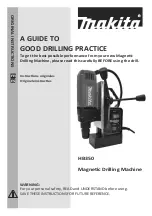
5
Bracing for reverse rotation
When drilling in reverse, the bit will rotate in a coun-
terclockwise direction. If the bit binds in the hole,
the bit will come to a sudden stop and the drill will
suddenly react in a clockwise direction.
A
B
C
shows an example
of properly bracing
the tool for reverse
rotation.
A. Reverse (counter-
clockwise) rota-
tion
B. Reaction
C. Brace drill with
motor housing
here
If the bit binds,
the motor housing
braced against the stud will hold the drill in position.
Using Control Switch
The control switch may be set to three positions: for-
ward, reverse and lock. Due to a lockout mechanism,
the control switch can only be adjusted when the
trigger is not pulled. Always allow the motor to come
to a complete stop before using the control switch.
For
Forward
(clockwise) rotation, push the control
switch from the left side of the tool.
Check the direc-
tion of rotation before use.
For
Reverse
(counterclockwise) rotation, push the
control switch from the right side of the tool.
Check
direction of rotation before use.
To
Lock
the trigger,
push the control switch to the
centre position. The trigger will not work while the
control switch is in the centre locked position. Always
lock the trigger or remove the battery pack before
performing maintenance, changing accessories,
storing the tool and any time the tool is not in use.
Starting, Stopping and Controlling Speed
These tools may be operated at any speed from 0
to full speed.
1. To
start
the tool, pull the trigger.
NOTE: A LED is turned on when the trigger is pulled.
2. To
vary
the driving speed, increase or decrease
pressure on the trigger. The further the trigger is
pulled, the greater the speed.
3. To
stop
the tool, release the trigger.
Drilling
1. Before drilling, be sure the workpiece is clamped
securely. A poorly secured piece of material may
result in personal injury or inaccurate drilling. Use
backing material to prevent damage to the work-
piece during breakthrough. When drilling in light
gauge metal or wood, use a wooden block to back
up the material to prevent damage to the workpiece.
2. When starting a hole, place the drill bit on the work
To start a selfeed bit, run the threaded feed screw
the bit to coast until the teeth contact the work sur-
face. Align the bit properly before proceeding. This
will reduce cocking and jamming when starting.
When drilling in metal, mark the centre of the hole
to be drilled with a centre punch to give the bit a
start and to prevent it from "walking." Lubricate the
drill bit with cutting oil when drilling iron or steel.
Use a coolant when drilling nonferrous metals such
as copper, brass or aluminum.
3. Always apply pressure in line with the bit. Use
enough pressure to keep the drill biting, but do
not push hard enough to cause the bit to bind.
When using twist drill bits, pull the bit out frequently
4. Reduce pressure and ease the bit through the last
part of the hole. While the tool is still running, pull
the bit out of the hole to prevent jamming.
When using selfeed bits, decrease the drilling pres-
sure when the feed screw point breaks through the
workpiece. Proceed with steady, even pressure.
MAINTENANCE
WARNING
To reduce the risk of injury, always
unplug the charger and remove the
battery pack from the charger or tool before
performing any maintenance. Never disassemble
the tool, battery pack or charger. Contact a
MILWAUKEE®
service facility for ALL repairs.
Maintaining Tool
Keep your tool, battery pack and charger in good
repair by adopting a regular maintenance program.
Inspect your tool for issues such as undue noise,
misalignment or binding of moving parts, breakage of
operation. Return the tool, battery pack, and charger
to a
MILWAUKEE®
service facility for repair. After six
months to one year, depending on use, return the
tool, battery pack and charger to a
MILWAUKEE®
service facility for inspection.
If the tool does not start or operate at full power with
a fully charged battery pack, clean the contacts on
the battery pack. If the tool still does not work prop-
erly, return the tool, charger and battery pack, to a
MILWAUKEE®
service facility for repairs.
WARNING
To reduce the risk of personal in-
jury and damage, never immerse
your tool, battery pack or charger in liquid or
Cleaning
Clean dust and debris from vents. Keep handles
clean, dry and free of oil or grease. Use only mild
soap and a damp cloth to clean, since certain clean-
ing agents and solvents are harmful to plastics and
other insulated parts. Some of these include gasoline,
turpentine, lacquer thinner, paint thinner, chlorinated
cleaning solvents, ammonia and household deter-
combustible solvents around tools.
Repairs
For repairs, return the tool, battery pack and charger
to the nearest authorised service centre.
ACCESSORIES
WARNING
Use only recommended accesso-
ries. Others may be hazardous.
For a complete listing of accessories, go online to
milwaukeetool.com.au / milwaukeetool.co.nz or
contact a distributor.


























